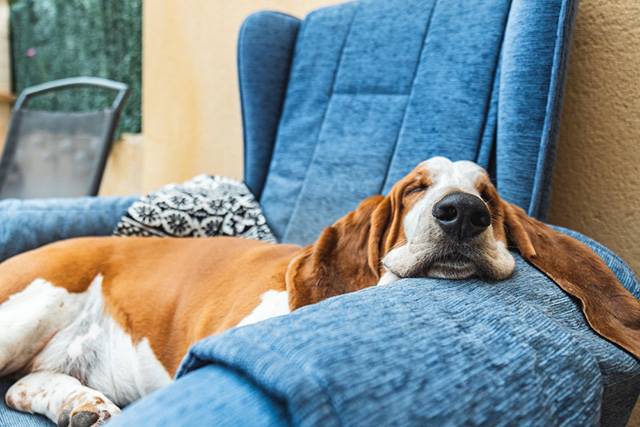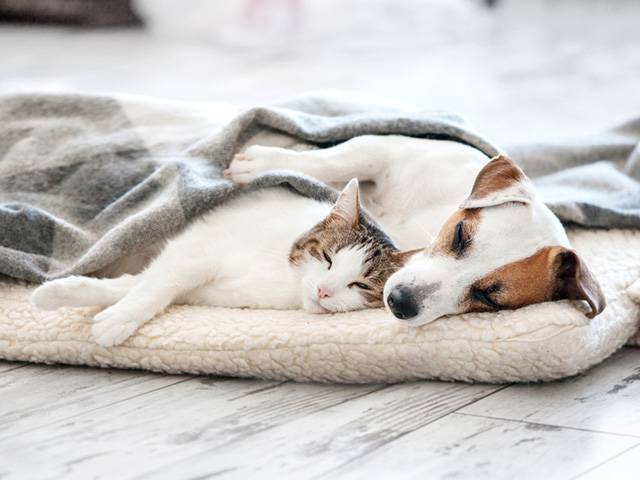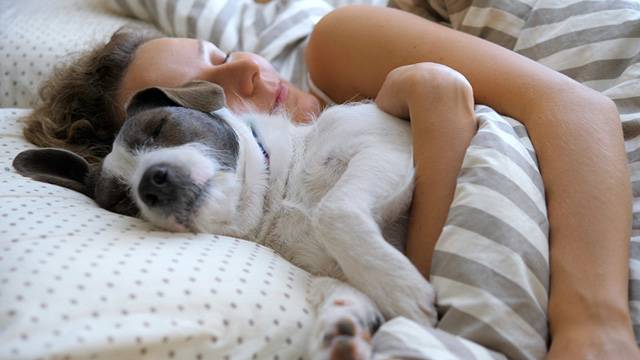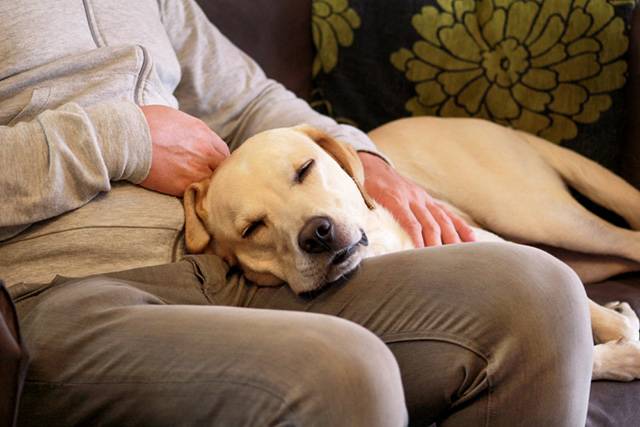You smiled to yourself last night as you felt your doggo leap into bed with you and sprawl out comfortably by your feet. You thought it was adorable how he still laid there dozing as you got up and got ready for weekend errands. He got up for a while, went on his morning walk with you, and then slept in the kitchen a few hours later while you prepared lunch…
As much as you love to watch him doze and dream, you find yourself wondering how much sleep is too much. So, let’s start by clearing the air:
It’s totally normal for dogs to sleep a lot!
In this article, we’ll discuss the typical sleep patterns of dogs and outline a few factors you should consider when it comes to determining whether your pup’s sleep habits are healthy. Spoiler alert: He’s probably doing just fine and sleeping as dogs do.
Dogs and Sleep
Dogs get their sleep based on a polyphasic schedule. This means they sleep in several shorter segments over the course of a 24-hour day, rather than sleeping only once when it’s dark outside (as most humans do). In addition, dogs have a shorter sleep cycle than humans do. Their sleep cycle consists of only two stages—deep sleep and REM sleep—and dogs enter their REM sleep much more quickly than humans do, usually after about 10 minutes of being asleep. In total, the average adult dog will spend about 10-13 hours asleep per day.
Another thing to remember about your dog’s sleep schedule is that canines are considered social sleepers. If you have another dog or other pets in the house, you may find that they tend to sleep around the same times and in close proximity to each other. This social sleeping nature also explains why your dog might enjoy sleeping in bed with you at night, and thus share in some of your sleeping hours.
A quick rule of thumb is that your dog probably spends 50% of his time sleeping, 30% lounging around, and 20% being active.
Factors to Consider
The amount your dog sleeps will depend on a variety of factors, from how old he or she is to what their personality is like.
— Age
Your dog may sleep more or less than the average depending on his age. Here’s a general breakdown for you:
| Stages | Hours of Sleep |
| Puppy | 18 – 20 hours |
| Adult | 10 – 14 hours |
| Senior | 16 – 18 hours |
Of the bunch, puppies sleep the most hours in total with senior dogs (aged 5+ years) following in close second. While pups need more shut-eye due to their still-growing bodies and their constant exploration of the world, senior dogs sleep more because their bodies need more frequent rest as they age.
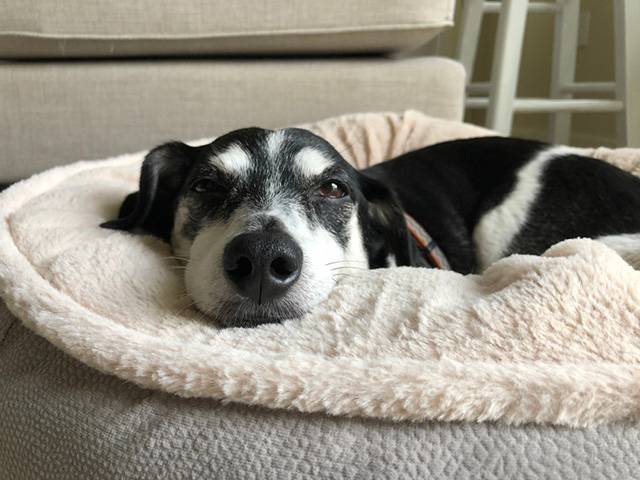
— Breed
Another factor that may impact how much sleep your dog gets is its breed. Size plays a major role here, with larger dogs requiring more sleep than smaller dogs; another thing to consider is the genetic background of your pup.
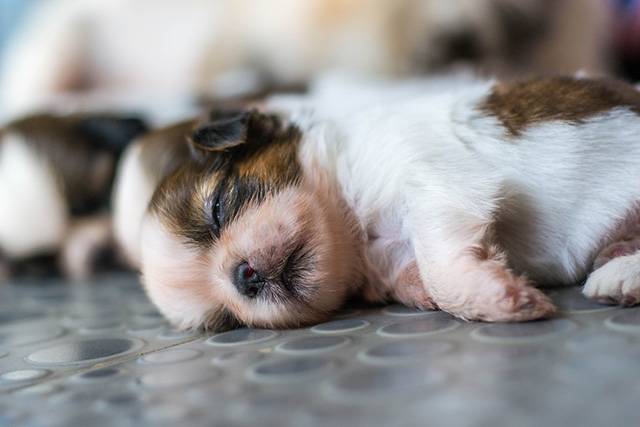
Boston terriers
- Pugs
- Shih tzu
- Pekingese
- Greyhounds
And those that require less sleep include:
- Border collies
- Beagles
- Labrador retrievers
- Jack Russell terriers
Note that dog breeds known to have breathing issues are likely to sleep more than those without breathing issues. In addition, dogs that were bred with physical activity in mind (such as retrieving or hunting) are likely to require less sleep and have more energy.
— Lifestyle
How active is your dog on a daily basis? Does he or she spend more time outdoors or lounging around inside? Is your canine friend a house pet or a therapy/guide dog?
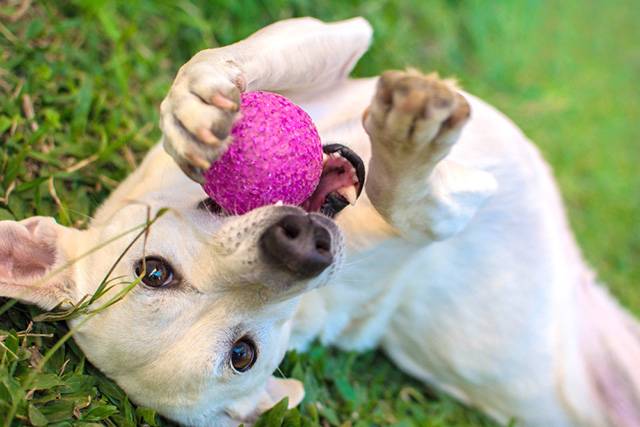
- Dogs that get more exercise tend to get more, higher-quality sleep.
- Dogs bred for purposes of labor or work tend to sleep less than others.
- If your dog has a job (therapy, guiding, police force), he or she may get less sleep during the day.
- Because dogs are social sleepers, they’re likely to sleep when you do; if you don’t sleep much, they might not either.
— Environment
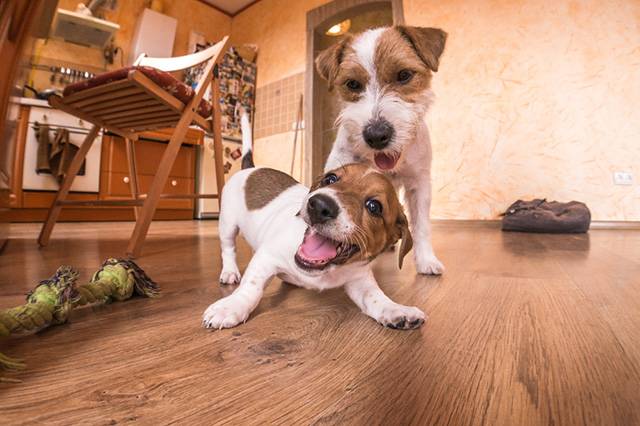
Is it a Problem?
So, if dogs really do sleep so much, how do you know when it becomes a problem?
One thing you should do is take note of any sudden changes to your dog’s sleep schedule or habits. If he or she used to play a lot during a certain time of day, but now only sleeps during that time, try to see if there’s a reason. If it has nothing to do with a schedule change on your end, it could be depression or even a physical ailment, in which case you should take your dog to the vet.
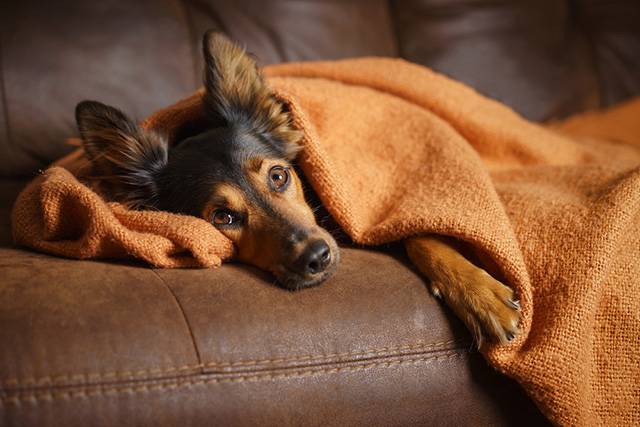
Health issues such as diabetes, depression, Lyme disease, and obesity can interfere with your dog’s sleep or make him want to sleep more. In addition, dogs can have sleep problems like narcolepsy (due to genetics), sleep apnea, or insomnia. If you suspect your dog has a health issue, you should take him or her to the vet and see what your treatment options are.
Conclusion
By now, you should have a better idea of how much sleep your dog needs and what to consider if you feel they’re getting too much (or not enough).
How much does your doggo sleep each day? And does he or she sleep in your bed with you? Let us know in the comments, and see what your fellow dog-lovers have to say.
Until next time, here’s to pet health and a healthy dose of ZZZs.
Photo credit: Daniel Myjones/Shutterstock; Gladskikh Tatiana/Shutterstock;
DiMedia/Shutterstock; Sara Hahn/Shutterstock; Saranya Loisamutr/Shutterstock;
Zoran Photographer/Shutterstock; Maila Facchini/Shutterstock;
Sundays Photography/Shutterstock; Lindsay Helms/Shutterstock;
